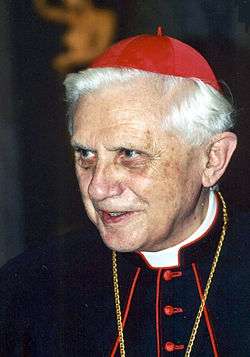Communio
Communio is a theological journal founded in 1972 by Joseph Ratzinger, Hans Urs von Balthasar, and Henri de Lubac.1 Communio is published in thirteen editions including German, English and Spanish. The English-language edition of Communio is a quarterly with articles on philosophy, the arts and the relationship between Catholicism and American culture. It emphasizes John Paul II's idea of new evangelization.1 SAGE distributes Communio to Europe and the British Commonwealth. They describe the purpose of Communio as in part, "to try to overcome the polarization between 'modernists' and 'traditionalists' in the Church, by offering a central forum where there may be both reconciliation and creativity."5
| Part of a series on the |
| Theology of Pope Benedict XVI |
|---|
 |
|
Movements
|
|
The journal Concilium, was founded in 1965 intending to keep the "spirit of Vatican II" in the church after the sessions of the Second Vatican Council had ended and the council fathers returned to their respective dioceses. Ratzinger, Von Balthasar and de Lubac, originally part of Concilium, left to form Communio.2 One of the reasons given for the split from Concilium was that the board of Concilium proposed itself as another official teaching authority alongside the bishops.4
Von Balthasar wrote of the then new journal, that it would, "scan the turmoil and confusion of battling ideologies and the clash of philosophies of life at the present day."3 Von Balthasar describes communion as purpose-driven: “Com-munio means community in the concrete, expressive sense of being brought together into a common fortification (mun: to munio, surround with a rampart; moenia: city walls), but also into a common achievement, task, administration, which at the same time can mean mutual satisfaction, gift, grace (mun: to munus)."3 He goes on to explore the dynamic of tension in communion: coming together, conflicting and then separating. In the process, conflict promotes inquiry, investigation and settlement. "All these acts are indispensable for discovering the truth in freedom."3
See also
- Nouvelle Théologie
References
1 https://www.communio-icr.com/about Communio's self description.
2 https://www.youtube.com/watch?v=ZLy188DgyEI Bishop Robert Barron on the different streams of thought before and after the Second Vatican Council.
3 https://www.communio-icr.com/files/balthasar33-1.pdf A pdf of Von Balthasar's article "Communio: A Project."
4 https://www.wordonfire.org/resources/article/yves-congar-and-the-meaning-of-vatican-ii/445/ Yves Congar's recollection of the reason for leaving Concilium and beginning Communio.